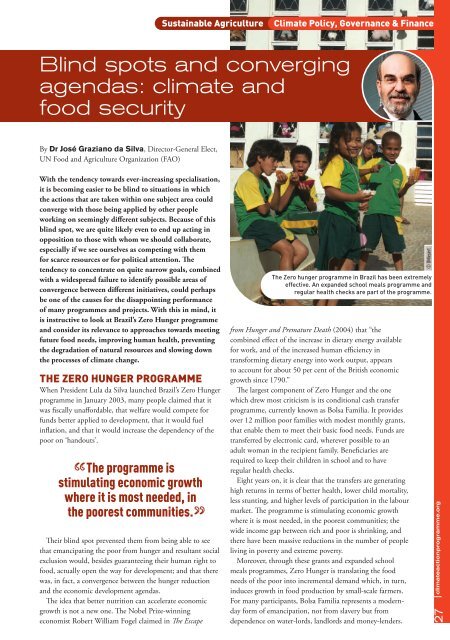Climate Action 2011-2012
You also want an ePaper? Increase the reach of your titles
YUMPU automatically turns print PDFs into web optimized ePapers that Google loves.
Sustainable agriculture<br />
<strong>Climate</strong> Policy, governance & Finance<br />
Blind spots and converging<br />
agendas: climate and<br />
food security<br />
By Dr José Graziano da Silva, Director-General Elect,<br />
UN Food and Agriculture Organization (FAO)<br />
With the tendency towards ever-increasing specialisation,<br />
it is becoming easier to be blind to situations in which<br />
the actions that are taken within one subject area could<br />
converge with those being applied by other people<br />
working on seemingly different subjects. Because of this<br />
blind spot, we are quite likely even to end up acting in<br />
opposition to those with whom we should collaborate,<br />
especially if we see ourselves as competing with them<br />
for scarce resources or for political attention. The<br />
tendency to concentrate on quite narrow goals, combined<br />
with a widespread failure to identify possible areas of<br />
convergence between different initiatives, could perhaps<br />
be one of the causes for the disappointing performance<br />
of many programmes and projects. With this in mind, it<br />
is instructive to look at Brazil’s Zero Hunger programme<br />
and consider its relevance to approaches towards meeting<br />
future food needs, improving human health, preventing<br />
the degradation of natural resources and slowing down<br />
the processes of climate change.<br />
The Zero hunger Programme<br />
When President Lula da Silva launched Brazil’s Zero Hunger<br />
programme in January 2003, many people claimed that it<br />
was fiscally unaffordable, that welfare would compete for<br />
funds better applied to development, that it would fuel<br />
inflation, and that it would increase the dependency of the<br />
poor on ‘handouts’.<br />
The programme is<br />
stimulating economic growth<br />
where it is most needed, in<br />
the poorest communities.<br />
Their blind spot prevented them from being able to see<br />
that emancipating the poor from hunger and resultant social<br />
exclusion would, besides guaranteeing their human right to<br />
food, actually open the way for development; and that there<br />
was, in fact, a convergence between the hunger reduction<br />
and the economic development agendas.<br />
The idea that better nutrition can accelerate economic<br />
growth is not a new one. The Nobel Prize-winning<br />
economist Robert William Fogel claimed in The Escape<br />
The Zero hunger programme in Brazil has been extremely<br />
effective. An expanded school meals programme and<br />
regular health checks are part of the programme.<br />
from Hunger and Premature Death (2004) that “the<br />
combined effect of the increase in dietary energy available<br />
for work, and of the increased human efficiency in<br />
transforming dietary energy into work output, appears<br />
to account for about 50 per cent of the British economic<br />
growth since 1790.”<br />
The largest component of Zero Hunger and the one<br />
which drew most criticism is its conditional cash transfer<br />
programme, currently known as Bolsa Familia. It provides<br />
over 12 million poor families with modest monthly grants,<br />
that enable them to meet their basic food needs. Funds are<br />
transferred by electronic card, wherever possible to an<br />
adult woman in the recipient family. Beneficiaries are<br />
required to keep their children in school and to have<br />
regular health checks.<br />
Eight years on, it is clear that the transfers are generating<br />
high returns in terms of better health, lower child mortality,<br />
less stunting, and higher levels of participation in the labour<br />
market. The programme is stimulating economic growth<br />
where it is most needed, in the poorest communities; the<br />
wide income gap between rich and poor is shrinking, and<br />
there have been massive reductions in the number of people<br />
living in poverty and extreme poverty.<br />
Moreover, through these grants and expanded school<br />
meals programmes, Zero Hunger is translating the food<br />
needs of the poor into incremental demand which, in turn,<br />
induces growth in food production by small-scale farmers.<br />
For many participants, Bolsa Familia represents a modernday<br />
form of emancipation, not from slavery but from<br />
dependence on water-lords, landlords and money-lenders.<br />
© UNiesert<br />
27 climateactionprogramme.org












